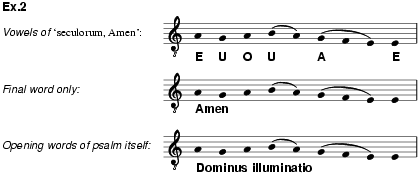
A technical pseudo-word formed from the vowels of the last six syllables of the doxology – ‘seculorum. Amen’ – and used in medieval office-books as an abbreviation when, at the close of an antiphon, it is necessary to indicate the psalm tone with its appropriate ending (differentia) to be used for the following psalm or canticle. Ex.1, indicating the first ending of the first tone, is taken from a 14th-century English monastic choir psalter, GB-Cu Ee.5.13. A readily available series of examples may be found in the Liber usualis: the endings for the psalms sung at the Little Hours on Sundays.

Some scribes wrote the last clause in full, ‘seculorum. Amen’. Others wrote ‘S. Amen’, or simply ‘Amen’, or ‘S. A. E.’. It is customary, however, always to make provision for the last six syllables, whatever the abbreviation used. When, for liturgical reasons, the verses ‘Gloria Patri’ and ‘Sicut erat’ are omitted, for example, in the psalms sung at the Office for the Dead, the psalter quoted above still indicates the ending by giving the notes for the last six syllables; but beneath them appear the opening words of the psalm itself. Ex.2 shows three ways of indicating the second ending of the 4th tone, all taken from GB-Cu Ee.5.13. F.M. Böhme mistook Evovae for a familiar Greek word, and was greatly exercised at the admission of a ‘Bacchanalian shout’ into the office-books of the Church: ‘Statt Amen der bacchische Freudenruf, evovae!’ (Das Oratorium, Leipzig, 1861).

MARY BERRY